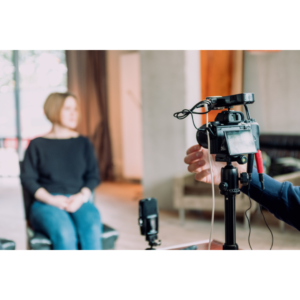The Duty of Legal Videography in Depositions and Tests
Legal videography has become a crucial device in both depositions and trials, offering a diverse method to recording witness testimonies. By catching not only the spoken word yet likewise the subtleties of non-verbal interaction, this medium boosts the reliability of testaments and protects essential proof for future proceedings. As lawyers significantly identify its value, it prompts a much deeper exam of exactly how these visual documents can influence juror perceptions and test results. What effects might these growths hold for the future of lawful technique?
Importance of Legal Videography
Legal videography plays a crucial role in the documentation and presentation of depositions and trials. This specific field incorporates technological abilities with legal understanding to develop a dependable record of procedures that can considerably influence case end results. The appearance of lawful videography boosts the understanding of witness statement, permitting jurors and courts to observe not only the talked words but also the demeanor, emotions, and body language of the witnesses.

The significance of legal videography prolongs past the court; it likewise plays an important role in protecting proof for future recommendation, whether for charms or additional lawsuit. Its assimilation into the legal process is important for guaranteeing a fair and exact depiction of the facts, ultimately contributing to the search of justice.

Refine of Legal Videography
While catching the subtleties of depositions and trials, the process of lawful videography includes numerous vital actions that make certain high-grade, precise recordings. At first, an expert lawful videographer prepares by reviewing the situation materials and recognizing the details requirements of the deposition or test. This prep work includes familiarizing themselves with the participants and the context, which helps in catching essential information.
On the day of the recording, the videographer establishes up the necessary equipment, which commonly consists of high-def cameras, microphones, and correct illumination. Making sure optimal angles and audio quality is important, as it directly impacts the efficiency of the recording. The videographer connects with lawyers and individuals to develop protocols, making sure that everybody recognizes the recording process.
Throughout the deposition or test, the videographer meticulously tapes the proceedings, paying attention to both verbal and non-verbal cues. legal videography. This consists of catching the temperament and reactions of witnesses and attorneys. After the session wraps up, the videographer may modify the video footage for clarity and compliance with lawful requirements, producing an end product that properly shows the procedures for future recommendation and use in legal contexts
Benefits in Depositions
The consolidation of videography in depositions offers countless advantages that enhance the general procedure of collecting proof. One primary advantage is the capacity to record witness testaments with aesthetic and auditory integrity, offering an extra accurate representation of the witness's behavior, tone, and body language. This multidimensional approach allows attorneys and juries to evaluate integrity better than typical written records alone.
In addition, videographed depositions function as an effective tool for preserving testament. Should a witness come to be inaccessible for trial, their recorded deposition can be played in court, ensuring that their proof continues to be obtainable and appropriate. This facet substantially decreases the threat of shedding important info that can influence case outcomes.
In addition, making use of lawful videography promotes much better prep work for lawyers. Reviewing video clip footage enables lawful groups to evaluate and refine their methods, determining strengths and weaknesses in their situations. This preparatory benefit can result in more engaging discussions in court.
Last but not least, videography enhances the general professionalism and reliability of the deposition procedure, instilling self-confidence in clients pertaining to the thoroughness of their lawful depiction. By leveraging technology, lawful specialists can substantially boost the effectiveness of depositions.
Effect on Tests
In several tests, the assimilation of videography can considerably affect the discussion of evidence and the court's understanding. Legal videography records witness testimonies and vital evidence in a dynamic format, enabling jurors to engage with the material on several levels. This visual component enhances the narration facet of a trial, offering context and emotional vibration that traditional text-based evidence may lack.
Additionally, video clip recordings can offer as effective tools for impeachment throughout cross-examination. When disparities emerge in between blog here a witness's previous statements and their courtroom testament, video clip evidence offers an unbiased referral that can persuade jurors' point of views. This immediacy and clarity can bolster the reliability of a celebration's narrative while at the same time undermining opposing debates.
In addition, making use of videography can help enhance complicated info, making it more accessible to jurors that might have a hard time to comprehend intricate information provided solely through verbal testament. By combining visuals with auditory info, lawful videography can enhance retention and understanding, inevitably influencing the jury's decision-making process. The influence of videography in trials prolongs beyond plain visual appeals; it plays an important duty in shaping the lawful landscape and outcomes.
Future Trends in Legal Videography
As we look towards the future of legal videography, numerous emerging trends promise to reshape its duty within the court room. One significant pattern is the assimilation of synthetic intelligence (AI) in video clip evaluation and editing - legal videography. AI can enhance the process of recognizing essential minutes in recorded depositions, permitting lawyers to rapidly access relevant content, thus enhancing efficiency in case preparation
In addition, the surge of online truth (VIRTUAL REALITY) and increased fact (AR) technologies is expected to transform how jurors experience evidence. By immersing jurors in a simulated environment, these modern technologies can provide a much more profound understanding of intricate circumstances, causing more informed deliberations.

In addition, the boosting need for remote depositions, accelerated by the COVID-19 pandemic, will likely proceed. Lawful videographers will certainly need to adjust to new software application and platforms to guarantee high-quality recordings in digital setups.
Finally, the growing focus on data safety will certainly necessitate more stringent protocols for storing and sharing video evidence. As the legal landscape progresses, legal videographers should stay abreast of these fads to keep their relevance and performance in the judicial procedure.

Verdict
In summary, legal videography offers an important feature in the judicial process, improving the honesty of depositions and trials. By capturing the subtleties of witness testimonies, this tool not just protects important evidence however likewise aids in presenting info efficiently to jurors. The value of aesthetic documentation in examining trustworthiness web and promoting cross-examination pop over to this site can not be overemphasized. As technology proceeds to evolve, lawful videography is poised to additional change its role within the lawful landscape.